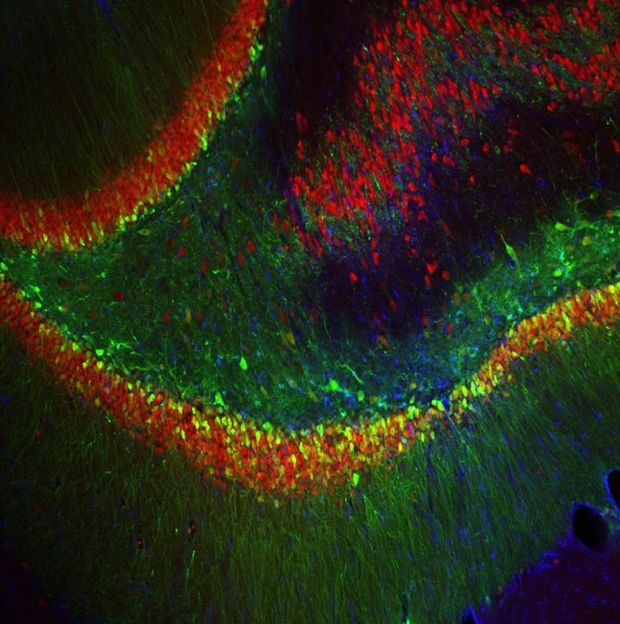A new factor in depression? Brain protein discovery could lead to better treatments
Advertisement
Low. Down. Less than normal. That's what the word depression means, and what people with depression often feel like. But sometimes, depression can mean too much of something - as new research shows.

The green cells show where the researchers used an injected virus to block production of FGF9 in rat brains - and reduce anxiety-like behavior.
University of Michigan - Akil laboratory
The discovery, about a protein called fibroblast growth factor 9 or FGF9, goes against previous findings that depressed brains often have less of key components than non-depressed brains.
In this case, people with major depression had 32 percent more of FGF9 in a key part of their brain than people without the condition. In rats, raising FGF9 levels artificially led to depression-like behavior changes, and repeated social stress caused brain FGF9 levels to rise.
Taken together, the findings provide more evidence that depression is a physical illness. If FGF9 or its effects prove to be a good target for drugs, the finding could eventually help lead to better medications for the mental health condition that affects millions of Americans.
"Fixing depression is not easy, because it's a disorder at the level of the circuits that connect brain cells, and many regions of the brain are involved," says Elyse Aurbach, the neuroscience doctoral student who is the paper's co-first author. "Still, this is the first time FGF9 has been identified as related to depression, and found to be active in a critical area of the brain for the disorder. We and others need to study it further to determine what is going on. It's very exciting."
Human differences: A surprising finding
They focus on fibroblast growth factors, molecules involved in cell growth and maintenance in the brain, and in other areas of the body. They've studied another FGF molecule, called FGF2, in the brain for years, trying to figure out why it's lower in people and animals with depression and other mental health disorders. They've even shown that giving FGF2 injections can calm anxious rats.
The team was surprised when FGF9 levels were higher in the brains of people who had had depression compared to those who had not. The increased levels held up even after they accounted for differences in the ways the individuals lived, and died, before their brain tissue was preserved for research.
Rodent studies reveal FGF9 function
Intrigued by the human results, the team decided to explore FGF9's role further through experiments with rats. This allowed them to do something they can't do in humans: try to determine if FGF9 rises in response to something, such as stress, or if levels are naturally higher and predispose someone to depression.
Original publication
Elyse L. Aurbach, Edny Gula Inui, Cortney A. Turner, Megan H. Hagenauer, Katherine E. Prater, Jun Z. Li, Devin Absher, Najmul Shah, Peter Blandino Jr., William E. Bunney, Richard M. Myers, Jack D. Barchas, Alan F. Schatzberg, Stanley J. Watson Jr., and Huda Akil; "Fibroblast growth factor 9 is a novel modulator of negative affect"; PNAS; 2015



















































